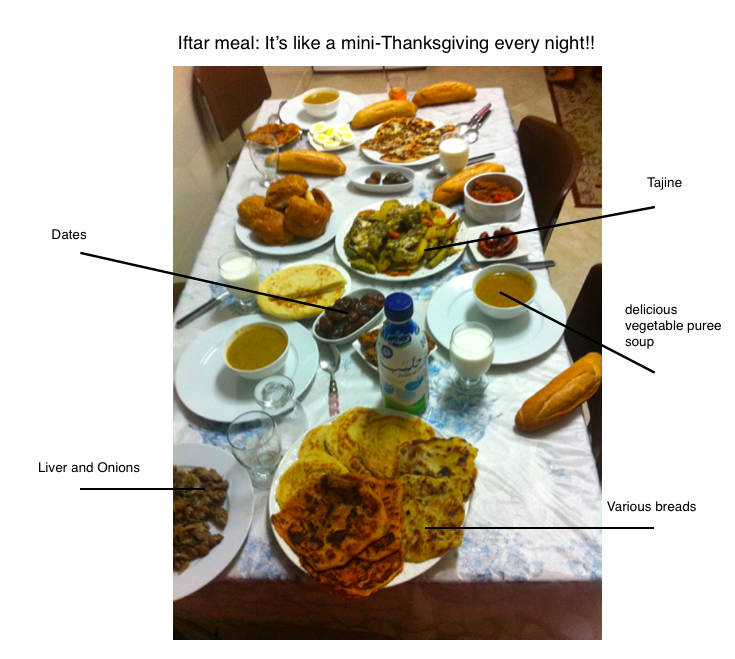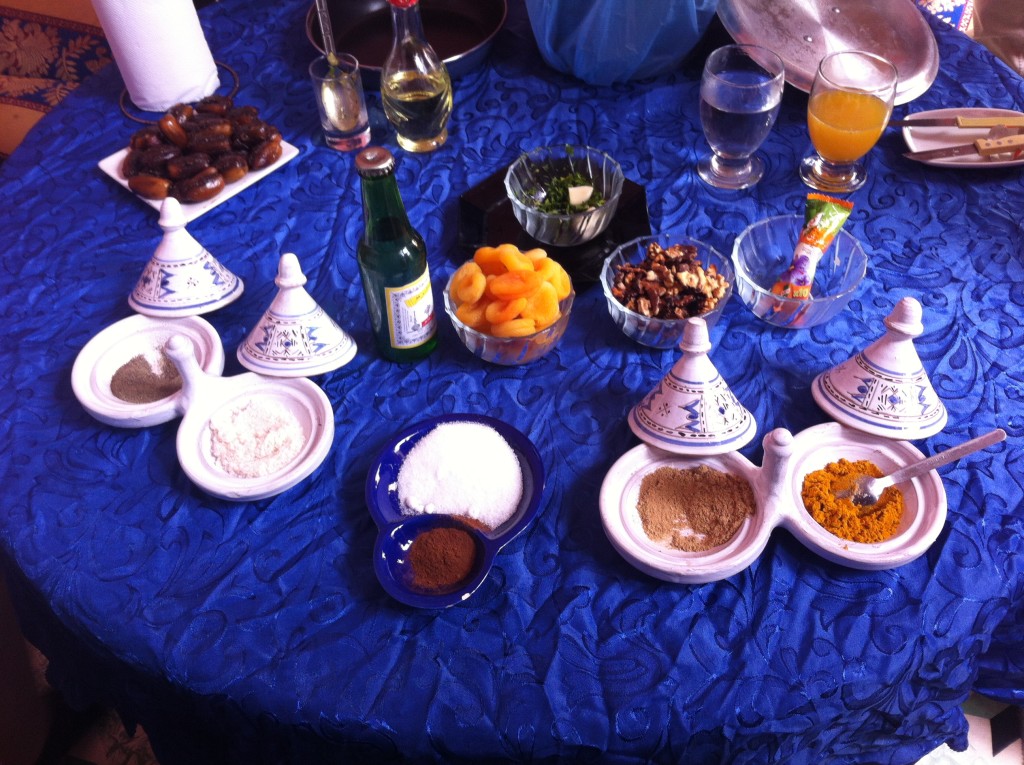Location: Rabat, Morocco
Normally, traveling requires a lot of patience for all the times waiting; in car rides, waiting for trains, and so on. But the type of patience I learned this week has nothing to do with traveling, it’s about being patient with yourself.
As I mentioned in my last post, Ramadan started last week. However, since we were in the desert and traveling around the first few days, we didn’t partake in it very much until this week. However, we did have a bit of trouble on the very first day on the train, because even though we’re not by any means required to fast, eating or drinking in public is obviously very rude. We’d gone straight from school to the train station to catch our train to Fes (which ended up being moved back by and hour and a half- Ramadan means normally set schedules are thrown out the window), so we hadn’t eaten since lunch, but couldn’t eat or snack because we were in public. Some of us furtively snuck a few pretzels to tide them other, but it was interesting because even though we were not fasting, we were affected just as much as everyone else. That’s turned out to be the norm so far.
Ramadan is the holy month according to Islamic calendar, celebrating the month when Muhammad first received his revelations from the Angel Gabriel. It is a month for reflection, donations to the poor, pilgrimage to Mecca, and daily fasting. Fasting is one of the five pillars of Islam, and it requires all able-bodied Muslims to refrain from eating, drinking, smoking, and having sexual relations from sunrise to sunset for the entire month. Travelers, pregnant or menstruating women, children, the elderly, and the sick are exempt. Fasting is supposed to leave time for you to reflect, pray, and celebrate the holy month. In the same way that Catholics give up something for lent, it is also a lesson in humility and devotedness to God.
Life in Morocco is entirely different during Ramadan. Most families wake up before sunrise to eat breakfast, then go back to sleep for a little while. Some have to work, but only for limited hours, then they can come home and sleep for the afternoon until evening. Iftar, the meal that breaks the fast, happens promptly at sundown. Literally the moment the call to prayer sounds, everything stops for Iftar. Coming back from our desert trip, our train got in so that we were walking home during Iftar. No cars in the streets, no one walking around, and the addition of string lights wrapped around the palm trees made it even stranger. At the cafes we passed people were eating with multiple dishes and drinks in front of them, but there was no one doing anything else.

Iftar can be taken outside the home, but it is often a meal that one celebrates at home with your family. You break the fast with a glass of milk and a few dates, then the men quickly go to the mosque to pray (there are mosques around every corner so it’s not a big deal), then come back and join the rest of the family. I’m still learning the names of all the foods, but there’s always some sort of soup, sometimes a vegetable puree with saffron, which is delicious, and sometimes one called hariria, which comes from the Berbers and has the same consistency as cream of wheat, but is bland with no taste. It’s nourishing I guess.
I’m still trying to work out our the Moroccan concept of eating. Even though I walk through a market street every morning with loads of fruits and vegetables for sale, in my host family at least we hardly eat any vegetables, and the only fruit we have is melon and watermelon. I’m not sure whether it’s because vegetables are not liked, or because meat is such a status symbol (because it’s expensive) that if you can afford meat, why bother to buy vegetables? They don’t really seem to take food groups into consideration. The two main food groups seem to be bread and sugar. Other than that the rest is optional. Diabetes is a bit of an epidemic here because of the amount of sugar, which comes in rectangular blocks, loaded into things. Even their concept of weight is different. Apparently another girl on my program was told that the probable reason that she isn’t married yet is because she doesn’t eat enough and is too thin. When I went to the pharmacy with our activities director, she weighed herself and was dismayed to find that she’d lost weight! I had a very hard time explaining to her that it is the opposite perception back home. I suppose that having enough to eat and thus being a reasonable weight is a symbol here, but I haven’t asked anyone to know for sure.
But back to Iftar; there’s always dates and almond paste and this pastry that looks like a sticky pretzel caused shebeka. There’s various types of breads, my favourite is one that is a bit like a hispanic arepa- slightly fried, flat, but thick enough to be chewy. Another one is like a British crumpet, but is thinner and is eaten with honey spread on it. There’s no traditional main course for Iftar, though tajine or various other meat-and-potatoes combinations is common. There was quite a lot of preparation the week that Ramadan started, the house was cleaned, and they stocked up on food. I came home one day to find my host grandmother sitting in the middle of the floor de-necking a dozen or so chickens. You know, casually. Despite this, all the usual food is still available in the streets of the medina. What amazes me is that starting from late afternoon all vendors are out selling this food, even though they can’t eat until sundown. I have a new appreciation for the patience and piety of Muslims; it takes a lot of willpower and determination to put the demands of your stomach out of your mind and fast, especially for a month.
We were told to expect some degree of distressed “hangry” behavior during Ramadan, especially in the afternoon as the day drags on and they haven’t been able to eat anything. The most apparent manifestation of this is the traffic and the accompanying road rage. They use car horns very liberally to express even the slightest discontent. We sit in class and listen to the solid stream of car horns as people sit in traffic trying to get home after their shortened workday. I sudder to think what Moroccans would do without car horns. I’ve also witnessed one Ramadan-induced fight so far. I was out on the main street in the medina buying a bottle of water from a little shop because my stomach was upset so I didn’t want to give it more to deal with by drinking the mineral-heavy tap water (which I’d weaned myself on to within the first week). Then a young man comes running down the street and turns the corner, angrily swooping over to each side shop to knock their boxes of crisps and such down onto the ground, with a dozen or so other blokes running behind him in pursuit. It was very bizarre but everyone around just helped pick up the upset boxes and continued on with life. Happy Ramadan.
I knew coming to Morocco that I was going to try to fast to some degree. While I haven’t fasted all the way like they do, so far what I’ve done is instead just eat much much less. So I’ll have some bread and tea for breakfast, a small snack for lunch, then Iftar around 7:45. While I am hungry during the day, it’s not difficult. However, unlike most of the city, our schedule does not change, so I’m a little wary of trying to sit through class from 9 until 4 with no food, so I think I’ll stick with my method for now and try complete fasting for one or two days here and there. We’ll see.
I did experience some trouble this week. It was much hotter and more humid than last week, and although I was eating the same amount as part of my demi-fasting, I hadn’t been drinking enough. It’s difficult, because as it is obviously rude to drink in front of people who are fasting, I don’t get a lot of chances to furtively drink enough water. Combined with the sweating from the heat, I was overheated and dehydrated and weak and hungry by the time Iftar was served for a few days before I realised what was wrong. It kept me exhausted and feeling slightly nauseated so that I didn’t want to eat anything and I fell asleep very early doing homework for a few nights in a row before I sorted myself out. My demi-fasting, although it is not nearly as vigorous as what everyone around me is doing, has taught me to be patient. I enjoy mental games, and this is just another one of those.You just have to be patient and accept that time will pass as it will and wait for sundown.
In a similar way, I experienced a lot of frustration with myself the first few weeks here in being unable to communicate very well. I wasn’t able to understand other or say what I wanted to say the first time, and I gave up very easily. If my host mother tried to explain something to me and I just didn’t quite understand her the first or second time, I would just smile and nod and give up. I don’t have a lot of patience when it comes to my limitations. This is true at home as well for things I know I don’t understand; anything technical, physics, mechanical processes, and so on. But communicating is something I pride myself on being very good at….in English. Here I’ve really been challenged because something I’m so good at at home is now a daily struggle. In class I’d understand maybe 65% of the lecture, on a good day. Listening to a language you’re still learning is a active task, you can’t passively listen and think of other things like I do in class at home. It took 100% of my concentration, and that was difficult. Similarly, I’d be afraid to barter for things in the streets for fear of not being able to communicate what I wanted to say. But I was (forced to be) patient and now, after being here 5 weeks, I understand almost everything said in class, the main ideas of our readings, and can carry conversations with my host family or shopkeepers with only minor Darija-French difficulties. My French is most likely very grammatically incorrect, and I usually have to explain something a few different ways and have things repeated or said slowly to be, but it works. Many people who’ve listened to me complain about the language barrier and my fears about French are probably thinking “I told you so” but that’s okay. I got there in my own time, and now I’ve learned to just be patient and things will usually get better, whether it be lingual comprehension or the prospect of iftar.

A picture taken at one of our cooking classes- learning to make tajine.
Location: Rue Tajine, Medina, Rabat, Morocco
 I thoroughly enjoyed seeing Geneva and their home, flying over the Swiss Alps on the plane ride there, and then again gaping at the view of the Alps through their kitchen window! Unbelievable.
I thoroughly enjoyed seeing Geneva and their home, flying over the Swiss Alps on the plane ride there, and then again gaping at the view of the Alps through their kitchen window! Unbelievable.


